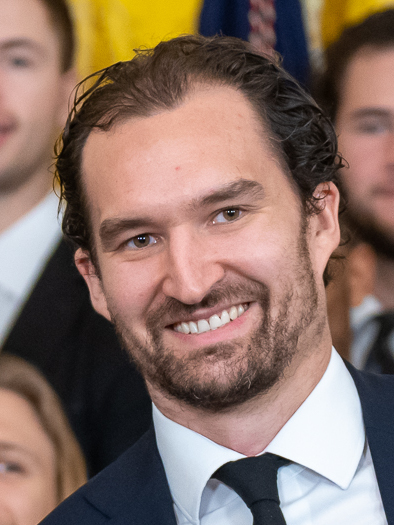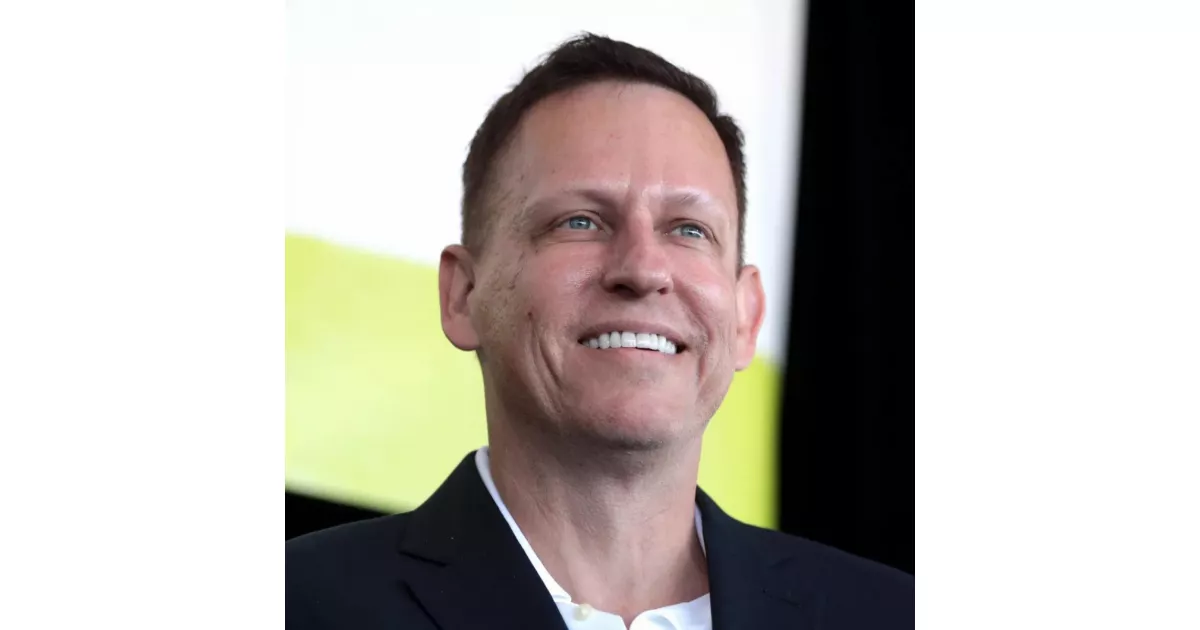Peter Thiel is a German-American entrepreneur, venture capitalist, and political activist. Best known as a co-founder of PayPal, Palantir Technologies, and Founders Fund, he also made an early, pivotal investment in Facebook. Thiel's significant net worth places him among the world's wealthiest individuals. His influence extends beyond business; he's considered a key intellectual figure in shaping Silicon Valley's modern culture and philosophy, especially related to technological innovation and libertarian politics.
1920: Thiel's note on Welfare Beneficiaries and Women's Franchise
In the same essay, Thiel noted that, "Since 1920, the vast increase in welfare beneficiaries and the extension of the franchise to women — two constituencies that are notoriously tough for libertarians — have rendered the notion of 'capitalist democracy' into an oxymoron."
1949: Soviet Union gets the bomb
In 1949, the Soviet Union got the bomb, and in 1950 the Korean War starts because the Soviet Union backs North Korea.
1950: Korean War Starts
In 1950, the Korean War started because the Soviet Union backed North Korea after obtaining nuclear weapon capabilities in 1949.
1964: Communist China gets the bomb
In 1964, Communist China got the bomb, and in 1965 the Vietnam War explodes.
1965: Vietnam War Explodes
In 1965, the Vietnam War exploded after Communist China developed nuclear weapon capabilities in 1964.
October 1967: Birth in Frankfurt am Main
In October 1967, Peter Andreas Thiel was born in Frankfurt am Main, Hesse, then part of West Germany.
October 1967: Peter Thiel's birth
Peter Andreas Thiel was born on October 1967.
1971: Family Moved to South Africa and South West Africa
In 1971, Thiel's family moved to South Africa and then South West Africa.
1977: Family Moved Back to the US
In 1977, Thiel's family moved back to the United States.
1977: Settled in Foster City, California
In 1977, the Thiel family settled in Foster City, California, after living in South Africa and South West Africa during apartheid.
1985: Valedictorian of Graduating Class
In 1985, Peter Thiel was the valedictorian of his graduating class at San Mateo High School.
1987: Co-founded The Stanford Review
In 1987, Peter Thiel co-founded The Stanford Review, a conservative and libertarian newspaper.
1989: Graduated from Stanford University
In 1989, Peter Thiel graduated from Stanford University.
1992: Law Clerk to Judge James Larry Edmondson
From 1992 to 1993, Thiel was a law clerk to Judge James Larry Edmondson of the U.S. Court of Appeals for the Eleventh Circuit.
1992: Graduated from Stanford Law School
In 1992, Peter Thiel graduated from Stanford Law School with a Juris Doctor degree.
1993: Derivatives Trader at Credit Suisse
In 1993, Thiel worked as a derivatives trader in currency options at Credit Suisse while also working as a speechwriter for William Bennett.
1995: Publication of The Diversity Myth
In 1995, Peter Thiel and David O. Sacks published "The Diversity Myth", a book that criticized political correctness and multiculturalism in higher education.
1996: Founded Thiel Capital Management
In 1996, Peter Thiel founded Thiel Capital Management.
1998: Started Fieldlink later called Confinity
In 1998, Max Levchin described his cryptography-related company idea to Thiel, which became their first venture called Fieldlink, later renamed Confinity.
1998: Co-founded PayPal
In 1998, Peter Thiel co-founded PayPal with Max Levchin and Luke Nosek.
1998: Co-wrote "The Diversity Myth"
In 1998, Thiel co-wrote the book "The Diversity Myth", which attacked liberalism and multiculturalism.
1999: Confinity Launched PayPal
In 1999, Confinity launched PayPal with the aim of creating a digital wallet for consumer convenience and security by encrypting data on digital devices.
1999: PayPal launched at a press conference
In 1999, PayPal launched at a press conference and received $3 million in venture funding using PayPal on PalmPilots.
1999: Purchase of PayPal founder's shares using Roth IRA
In 1999, Peter Thiel purchased 1.7 million founder's shares in the entity that would become PayPal using $1,700 in a Roth IRA.
1999: PayPal's Mission
In 1999, Thiel stated that PayPal's mission was liberating people from the erosion of the value of their currencies due to inflation.
2000: Mergers with X.com and Pixo
In 2000, PayPal continued to grow through mergers with Elon Musk's online financial services company X.com, and with Pixo, a company specializing in mobile commerce.
February 2002: PayPal Went Public
On February 15, 2002, PayPal went public.
2002: PayPal Sold to eBay
In 2002, PayPal was sold to eBay for $1.5 billion, where Thiel was the CEO till the sale.
May 2003: Incorporated Palantir Technologies
In May 2003, Peter Thiel incorporated Palantir Technologies, a big data analysis company.
2003: Launched Palantir Technologies
In 2003, Peter Thiel launched Palantir Technologies, a big data analysis company, and has been its chairman since its inception.
2003: Bet on Weakening US Dollar
In 2003, Peter Thiel successfully bet that the United States dollar would weaken.
2003: Last chess competition
In 2003, Peter Thiel, who holds the title of Life Master, last competed in chess.
August 2004: First Outside Investment in Facebook
In August 2004, Peter Thiel became Facebook's first outside investor when he acquired a 10.2% stake in the company for $500,000.
August 2004: Angel Investment in Facebook
In August 2004, Peter Thiel made a $500,000 angel investment in Facebook for a 10.2% stake in the company and joined Facebook's board.
2004: Predicted Dot-Com Bubble Migration
In 2004, Thiel spoke of the dot-com bubble having migrated into a growing bubble in the financial sector, and specified General Electric and Walmart as vulnerable.
2004: Writing of The Straussian Moment
In 2004, Thiel wrote "The Straussian Moment", an essay considered fundamental to his political thinking, arguing for a reexamination of modern politics after the September 11 attacks.
2005: Clarium Saw 57.1% Return
In 2005, Clarium saw a 57.1% return as Thiel predicted that the dollar would rally.
2005: Thiel creates Founders Fund
In 2005, Peter Thiel created Founders Fund, a San Francisco-based venture capital fund. Sean Parker, Ken Howery, and Luke Nosek are other partners in the fund.
September 2006: Donation to Methuselah Mouse Prize foundation
In September 2006, Peter Thiel pledged $3.5 million to the Methuselah Mouse Prize foundation to foster anti-aging research, citing advances in biological science.
2006: Clarium Experienced Loss
In 2006, Clarium faltered with a 7.8% loss.
2006: Backing the Singularity Institute
In 2006, Peter Thiel provided $100,000 of matching funds to back the Singularity Challenge donation drive of the Singularity Institute for Artificial Intelligence.
December 2007: Thiel Endorses Ron Paul for President
In December 2007, Thiel endorsed Ron Paul for President in the 2008 United States presidential election.
2007: Clarium's Assets Under Management Grew
In 2007, Clarium's assets under management grew after achieving a 40.3% return to more than $7 billion.
2007: Gawker article outing Thiel
In 2007, Gawker published an article publicly outing Peter Thiel, headlined "Peter Thiel is totally gay, people."
2007: Matching funds for the Singularity Institute's donation drive
In 2007, Peter Thiel provided half of the $400,000 matching funds for the Singularity Institute's donation drive.
2007: Relationship with Matt Danzeisen
In 2007, Peter Thiel was dating Matt Danzeisen, who was vice president of BlackRock at the time.
2007: Helped time Facebook's Series D
In 2007, Zuckerberg credited Thiel with helping him time Facebook's Series D.
April 2008: Pledge to Seasteading Institute
On 15 April 2008, Peter Thiel pledged $500,000 to the Seasteading Institute, which aims to establish autonomous ocean communities.
2008: Thiel Donates to the Committee to Protect Journalists (CPJ)
Beginning in 2008, Thiel has donated over $1 million to the Committee to Protect Journalists (CPJ).
2008: Facebook's Series D closed before the 2008 financial crisis
In 2007, Zuckerberg credited Thiel with helping him time Facebook's 2007 Series D, which closed before the 2008 financial crisis.
2008: Financial Markets Collapsed
In 2008, Clarium's assets fell after financial markets collapsed.
2008: Thiel contributes to John McCain campaign
In 2008, after Ron Paul failed to secure the Republican nomination, Thiel contributed to the John McCain campaign.
2009: Concerns about the technological singularity
At the 2009 Singularity Summit, Peter Thiel expressed his concern that the technological singularity was not arriving soon enough.
2009: Further Decline After Financial Markets Collapsed
In 2009, Clarium's assets fell again after financial markets collapsed.
2009: The Education of a Libertarian Essay
In 2009, Nick Land identified Thiel's essay "The Education of a Libertarian" and his statement questioning the compatibility of freedom and democracy as a key moment in the Dark Enlightenment movement's development.
2009: The Guardian's Description of Thiel's Neoconservatism
In 2009, The Guardian described Thiel as a neoconservative and highlighted his involvement in the online group "TheVanguard.org", noting his philosophical alignment with René Girard and his views on enlightenment thinkers.
2009: Funding of Taxpayers Clearing House Video
In 2009, Thiel helped fund James O'Keefe's "Taxpayers Clearing House" video, a satirical look at the Wall Street bailout.
September 2010: Thiel expresses skepticism about consumer Internet growth but sees Facebook as undervalued
In September 2010, Peter Thiel expressed skepticism about the growth potential of the consumer Internet sector but argued that Facebook, with a secondary market valuation of $30 billion at the time, was relatively undervalued compared to other Internet companies.
September 2010: Creation of Thiel Fellowship
On 29 September 2010, Peter Thiel created the Thiel Fellowship, offering $100,000 over two years to young people to drop out of college and start their own ventures.
2010: Thiel co-founds Valar Ventures
In 2010, Peter Thiel co-founded Valar Ventures, an internationally focused venture firm, with Andrew McCormack and James Fitzgerald.
2010: Homocon 2010
In 2010, Thiel invited conservative columnist Ann Coulter to Homocon as a guest speaker.
2010: Thiel supports Meg Whitman
In 2010, Thiel supported Republican Meg Whitman in her unsuccessful bid for the governorship of California, contributing the maximum allowable $25,900 to the Whitman campaign.
August 2011: New Zealand citizenship granted in private ceremony
In August 2011, Peter Thiel received New Zealand citizenship in a private ceremony at the New Zealand consulate in Santa Monica, California. Then-Minister of Internal Affairs Nathan Guy waived normal residency requirements under an "exceptional circumstances" clause of the Citizenship Act.
November 2011: Creation of Breakout Labs
In November 2011, the Thiel Foundation announced the creation of Breakout Labs, a grant-making program for innovative research outside academic institutions.
2011: Religious beliefs
As of 2011, Peter Thiel described his religious beliefs as "somewhat heterodox", affirming his belief in Christianity but not feeling the need to convince others.
2011: Investor Pullout from Clarium
By 2011, many key investors pulled out of Clarium, reducing the value of its assets to $350 million.
2011: Ann Coulter dedicates Demonic to Thiel
In 2011, Ann Coulter dedicated her book, Demonic: How the Liberal Mob Is Endangering America, to Thiel.
2011: Donation to Christchurch earthquake appeal fund
In 2011, Peter Thiel donated NZ$1 million to an appeal fund for the casualties of the Christchurch earthquake.
2011: Thiel founds Thiel Capital
In 2011, Peter Thiel founded Thiel Capital, a venture capital fund and family office based in Los Angeles. It provides strategic and operational support for his ventures and incubated Founders Fund, Mithril, Valar, the Thiel Fellowship, and Breakout Labs.
2011: Donation and resignation from Seasteading Institute
In 2011, Peter Thiel gave $1.25 million to the Seasteading Institute but resigned from its board the same year.
2011: Thiel invested in Grandmaster Capital Management
In 2011, Peter Thiel made his first investment in a hedge fund managed by an outside manager: Grandmaster Capital Management, founded by Patrick Wolff.
2011: Granted New Zealand Citizenship
In 2011, Peter Thiel was granted New Zealand citizenship, which later became controversial.
2011: Citizenship application and investments in New Zealand
In 2011, Peter Thiel's New Zealand citizenship application cited his contribution to the economy through a venture capital fund in Auckland, investments in local companies, and a donation to the Christchurch earthquake appeal fund. Xero founder Rod Drury provided a formal reference.
2011: Thiel at the Oslo Freedom Forum
In 2011, Thiel was a featured speaker at the Oslo Freedom Forum, and the Thiel Foundation was one of the event's main sponsors.
January 2012: Support for Endorse Liberty Super PAC
In January 2012, Peter Thiel, along with Nosek and Scott Banister, supported the Endorse Liberty Super PAC with $3.9 million to promote Ron Paul by setting up YouTube channels and buying ads.
April 2012: First set of grantees for Breakout Labs
In April 2012, Breakout Labs announced its first set of grantees, awarding $4.5 million to 12 startups.
May 2012: Facebook's IPO and Thiel sells shares
In May 2012, during Facebook's initial public offering, which valued the company at nearly $100 billion ($38 per share), Peter Thiel sold 16.8 million shares for $638 million.
June 2012: Thiel launches Mithril Capital Management
In June 2012, Peter Thiel launched Mithril Capital Management with Jim O'Neill and Ajay Royan, targeting companies beyond the startup stage and ready to scale up, with an initial fund of $402 million.
July 2012: Thiel donates to the Club for Growth
In July 2012, Thiel made a $1 million donation to the Club for Growth, a fiscally conservative organization.
August 2012: Thiel sells remaining Facebook stake
In August 2012, Peter Thiel sold almost all of his remaining stake in Facebook immediately after the early investor lock-up period concluded, earning between $19.27 and $20.69 per share, totaling $395.8 million. This brought his total earnings from Facebook shares to over $1 billion.
2012: Crescendo Equity established with Peter Thiel's sponsorship
In 2012, Crescendo Equity, a private equity firm focusing on mid-cap manufacturing and technology companies in Asia, was established with Peter Thiel's sponsorship.
2012: Mithril Capital Investment Committee Chair
In 2012, Peter Thiel co-founded Mithril Capital and was investment committee chair.
2012: Thiel donates to Minnesotans United for All Families
In 2012, Thiel donated $10,000 to Minnesotans United for All Families, in order to fight Minnesota Amendment 1 that proposed to ban marriage between same-sex couples there.
2012: Teaching CS 183: Startup at Stanford University
In spring 2012, Peter Thiel taught the class CS 183: Startup at Stanford University. Notes from the course, taken by student Blake Masters, would become the basis for the book Zero to One.
2013: Thiel Foundation's donations to Singularity Institute
As of 2013, the Thiel Foundation had donated over $1 million to the Singularity Institute.
2013: Thiel stops going to the World Economic Forum
Peter Thiel stopped going to the World Economic Forum in 2013 because he considers it a place without individuals
June 9, 2014: Epstein arranged for Barak to meet Thiel in New York
On June 9, 2014, Jeffrey Epstein arranged for Ehud Barak to meet Peter Thiel in New York.
September 2014: Release of 'Zero to One'
In September 2014, "Zero to One: Notes on Startups, or How to Build the Future" by Peter Thiel and Blake Masters, based on notes from Thiel's 2012 Stanford class, was released.
2014: Interest in anti-aging research
At the Venture Alpha West 2014 conference, Peter Thiel expressed his desire to make progress in anti-aging research and revealed that he is registered for cryonic preservation with Alcor Life Extension Foundation.
2014: Founders Fund backs DeepMind before Google acquisition
In early 2014, Founders Fund, one of Peter Thiel's funds, backed DeepMind, a UK start-up, before it was acquired by Google for £400 million.
March 2015: Thiel joined Y Combinator as a part-time partner
In March 2015, Peter Thiel joined Y Combinator as one of 10 part-time partners.
December 2015: Financial Backer of OpenAI
In December 2015, Peter Thiel was announced as one of the financial backers of OpenAI, a nonprofit company aimed at the safe development of artificial general intelligence.
2015: Part-time Partner at Y Combinator
From 2015 to 2017, Peter Thiel was a part-time partner at Y Combinator.
2015: Epstein invested 40 million in Valar
In 2015, Jeffrey Epstein invested a total of 40 million in Valar.
2015: Purchase of estate near Wānaka
In 2015, Peter Thiel purchased a 193-hectare estate near Wānaka, New Zealand. As a citizen, he did not require permission from New Zealand's Overseas Investment Office.
2015: Founders Fund became first institutional investor in cannabis industry
In 2015, Peter Thiel's Founders Fund became the first institutional investor in the cannabis industry, by investing in Privateer Holdings.
2015: Thiel's Conversation with Tyler Cowen
In 2015, during a conversation with Tyler Cowen, Thiel claimed that innovative breakthroughs were primarily occurring in computing and IT, while lamenting the lack of progress in space travel, high-speed transit, and medical devices due to regulation.
2015: 1517 Fund founded with backing from Thiel
In 2015, the 1517 Fund was founded by Danielle Strachman and Michael Gibson, both from the Thiel Fellowship founding team. Peter Thiel backs the fund, which provides cash grants and investments to "dropouts, renegade students, and deep tech scientists".
May 2016: Thiel confirmed funding of Hulk Hogan's lawsuit against Gawker
In May 2016, Peter Thiel confirmed in an interview with The New York Times that he had paid $10 million in legal expenses to finance Hulk Hogan's lawsuit against Gawker Media.
August 2016: Gawker announced closing due to lawsuit
In August 2016, Gawker announced it was permanently closing due to the lawsuit funded by Peter Thiel.
August 2016: Thiel published an opinion piece in The New York Times
On 15 August 2016, Peter Thiel published an opinion piece in The New York Times in which he argued that his defense of online privacy went beyond Gawker and that athletes and business executives have the right to stay in the closet as long as they want to.
October 2016: Donation to Donald Trump's 2016 presidential campaign
On 15 October 2016, Peter Thiel donated $1.25 million to support Donald Trump's 2016 presidential campaign after initially supporting Carly Fiorina.
November 2016: Ceremonial first move at World Chess Championship 2016
On November 30, 2016, Peter Thiel made the ceremonial first move in the first tiebreak game of the World Chess Championship 2016 between Sergey Karjakin and Magnus Carlsen.
2016: Epstein pitched Reporty to Valar, but was rejected
In 2016, Jeffrey Epstein pitched Reporty (later Carbyne) to Valar, but the proposal got rejected.
2016: Apology for statements in 'The Diversity Myth'
In 2016, Peter Thiel apologized for insensitive statements he made in the book "The Diversity Myth" regarding the rape crisis movement and multicultural rape charges, stating that he wished he'd never written those things and that rape in all forms is a crime.
2016: Funding of Bollea v. Gawker Lawsuit
In 2016, Peter Thiel confirmed that he had funded Hulk Hogan in the Bollea v. Gawker lawsuit, which ended with Gawker losing the case. Gawker had previously outed Thiel as gay.
2016: Thiel sells additional Facebook shares
In 2016, Peter Thiel sold slightly under 1 million of his Facebook shares for approximately $100 million.
2016: Interest in parabiosis
In a 2016 interview, Peter Thiel expressed interest in the science of parabiosis, including young blood transfusion, for potential health benefits.
February 2017: Donations to the Methuselah Mouse Prize foundation
As of February 2017, Peter Thiel had donated over $7 million to the Methuselah Mouse Prize foundation.
November 2017: Thiel reduces Facebook holdings further
In November 2017, Peter Thiel sold another 160,805 shares of Facebook for $29 million, reducing his holdings to 59,913 Class A shares.
November 2017: Y Combinator severed ties with Thiel
In November 2017, it was reported that Y Combinator had severed its ties with Peter Thiel.
2017: Thiel as a limited partner at Social Capital
A 2017 Globe and mail article names Peter Thiel as a limited partner at Social Capital.
2017: Startup Ambrosia
In 2017, Ambrosia startup founder told TechCrunch they had never been contacted by Thiel or Thiel Capital.
2017: Anduril is founded with backing from Founders Fund
In 2017, Anduril, a defense hardware startup founded by Palmer Luckey and others, was backed by the Founders Fund since its inception. Thiel mentored Palmer Luckey.
2017: Crescendo Equity invested in Korea's HPSP
In 2017, Crescendo Equity Partners invested in Korea's HPSP, transforming it into a global player in the semiconductor equipment sector.
2017: Founders Fund invests in Bitcoin
In 2017, Founders Fund bought about $15–20 million worth of bitcoin.
2017: Newsom acknowledges Thiel's support for criminal justice reform and marriage equality
In 2017, Gavin Newsom acknowledged Thiel's support for criminal justice reform and marriage equality, while noting Thiel's alignment with President Donald Trump.
2017: Ended partnership with Y Combinator
In 2017, Peter Thiel ended being a part-time partner at Y Combinator.
2017: Thiel invests in Clearview AI
In 2017, Peter Thiel was among the first outside investors in Clearview AI, a facial recognition technology startup. The startup raised concerns in the tech world and media for its risks of weaponization.
2017: Citizenship status made public
In 2017, Peter Thiel's New Zealand citizenship status, obtained in August 2011, was made public.
2017: Epstein introduced Thiel to Vitaly Churkin
In 2017, Russian diplomat Vitaly Churkin, who died in 2017, was one of the people introduced to Peter Thiel by Jeffrey Epstein.
2017: Seasteads are "not quite feasible"
In a 2017 interview, Peter Thiel said seasteads are "not quite feasible from an engineering perspective" and "still very far in the future".
January 2018: Bitcoin holdings surge in value for Founders Fund
In January 2018, Founders Fund informed its investors that its bitcoin holdings were worth hundreds of millions of dollars due to the cryptocurrency's surge in value.
July 2018: Donation to Trump Victory Committee
In July 2018, Peter Thiel donated $250,000 to the Trump Victory Committee to support the Republican National Committee during the 2018 midterm elections and Trump's 2020 re-election campaign.
2018: Chinese investors in Kleo-Connect since 2018
Around the early 2020s, the Bavarian startup Kleo-Connect successfully developed a highly advanced satellite technology. Since 2018, it was feared the technology would fall into the hand of the PLA through its Chinese investors.
2018: Move to Los Angeles
In 2018, Peter Thiel moved from San Francisco to Los Angeles, citing intolerance of conservatives, insularity, and high prices in San Francisco.
2018: Founders Fund invested in Carbyne
In 2018, the Founders Fund invested in the Israeli company Carbyne.
2018: Founders Fund joined Carbyne's Series B
In 2018, the Founders Fund joined Carbyne's $15 million Series B.
2019: Growth of Roth IRA investment to over $5 billion
By 2019, Peter Thiel's $1,700 investment in PayPal founder's shares in a Roth IRA had grown to over $5 billion due to reinvestments in companies like Palantir and Facebook.
2019: Interview at the Hoover Institution about "The Straussian Moment"
In 2019, Peter Thiel's essay "The Straussian Moment" was the subject of an interview at the Hoover Institution.
2019: Thiel backed 1Confirmation crypto investment fund
In 2019, Peter Thiel, Mark Cuban, and Marc Andreessen backed the San Francisco-based crypto investment fund 1Confirmation.
April 2020: Thiel owns less than 10,000 Facebook shares
As of April 2020, Peter Thiel owned less than 10,000 shares of Facebook.
2020: Thiel an investor in funds managed by 8VC and Disruptive Technology Advisers
According to a Bloomberg article in 2020, Peter Thiel was an investor in funds managed by 8VC and in the bank Disruptive Technology Advisers.
2020: Jason Camm joins boards of EnClear Therapies and ATAI Life Sciences
In 2020, Jason Camm became a board member of EnClear Therapies and a director of ATAI Life Sciences, a German unicorn founded by Christian Angermayer, a friend of Peter Thiel.
2020: Thiel became a strategic partner and anchor investor of Elevat3
In 2020, Peter Thiel became a strategic partner and anchor investor of Elevat3, set up by Christian Angermayer's Apeiron Investment Group, to invest in startups in German-speaking countries, focusing on life sciences, deep tech, fintech, property and insurance, and invested in the Neunkirchen-based startup Neodigital through the fund.
2020: Thiel served on AbCellera's board
In 2020, Peter Thiel served on AbCellera's board.
2020: Activity of Free Forever PAC
In 2020, Peter Thiel's political-action committee, Free Forever, was active only during the 2020 election cycle and supported Kris Kobach's failed U.S. Senate bid.
2020: Support for Trump's re-election campaign
Peter Thiel's donation to the Trump Victory Committee in July 2018 was to support Trump's 2020 re-election campaign.
2021: Danzeisen's role in Bridgetown
By 2021, Matt Danzeisen was chairman of Bridgetown 1 and Bridgetown 2, sponsored by Thiel Capital and Richard Li's Pacific Century Group.
2021: Crescendo's investment led to Movensys name change
In 2021, Crescendo's investment led to Soft Servo Group changing its name to Movensys.
2021: Thiel backed A-Star Partners first fund
In 2021, Peter Thiel backed the first fund of A-Star Partners, founded by Kevin Hartz, former partner at Founders Fund.
2021: Thiel Became an FBI Informant
In 2021, Peter Thiel became an FBI informant. According to former FBI agent Johnathan Buma, Peter Thiel, Elon Musk and David Sacks have been targets of Russian intelligence.
2021: Thiel joins SNÖ Ventures
In 2021, Peter Thiel joined Oslo-based SNÖ Ventures as an investor and strategic partner, accompanied by a group of international strategic advisors.
2021: Roth IRA investment revealed by ProPublica
In 2021, ProPublica revealed that Peter Thiel had purchased 1.7 million founder's shares in PayPal using $1,700 in a Roth IRA in 1999. The investment grew to over $5 billion by 2019.
2021: Thiel's Article for Die Welt
In 2021, Thiel wrote an article for Die Welt arguing that Germany's fear of extremism hinders its potential in politics and technology, and criticized "green quietism".
2021: Danish National Police responded to Folketing on Praxis project concerns
In 2021, the Danish National Police responded to the Folketing regarding concerns about the Praxis project.
February 2022: Largest donor to Republican candidates
By February 2022, Peter Thiel was one of the largest donors to Republican candidates in the 2022 election campaign.
February 2022: Thiel to leave Meta board to support Trump candidates
On 7 February 2022, Peter Thiel announced he would not seek re-election to the board of Meta, Facebook's owner, at the 2022 annual stockholders' meeting. After 17 years, he decided to leave the board to support pro-Donald Trump candidates in the 2022 United States elections.
November 2022: Donations to senatorial and congressional candidates
By November 2022, Peter Thiel had spent 32 million supporting 16 senatorial and congressional candidates, including Blake Masters and JD Vance.
2022: Daniel Ek's investment in Helsing
Arctic Today sees the strong transatlantic bond between Sweden and the US as is evidenced by Daniel Ek's Prima Materia's investment in Helsing (a strategic partner of Palantir), which happened three months before Russia's 2022 invasion of Ukraine.
2022: Thiel as Chairman of Palantir Technologies
As of 2022, Peter Thiel continues to be the chairman of Palantir Technologies.
2022: Thiel backed Wischoff Ventures
In 2022, Peter Thiel backed B2B-focused Wischoff Ventures founded by solo GP Nichole Wischoff.
2022: Endorsement of Blake Masters' Senate campaign
In 2022, Peter Thiel endorsed Blake Masters' campaign in the 2022 United States Senate election in Arizona, donating more than $10 million.
2022: 1789 Capital co-founded with instrumental force from Thiel
In 2022, Peter Thiel was an instrumental force behind the creation of 1789 Capital, co-founded by Omeed Malik and Christopher Buskirk, intended to create a "parallel economy".
2022: Formation of Rivada Space Networks
In 2022, Rivada Space Networks was formed, drawing its personnel mainly from Kleo-Connect, to bring in the US's "highest conservative circles" to Kleo-Connect.
2022: Tacora's inaugural fund raised US$350 million with US$250 million from Thiel
In 2022, Tacora's inaugural fund raised US$350 million in total, including US$250 million from Peter Thiel, which was considered an "unusually large investment".
2022: Satirical song 'Right time to Thiel' released
In 2022, after Thiel hired former Austrian chancellor Sebastian Kurz for Thiel Capital, Jan Böhmermann of the ZDF wrote and performed the satirical song "Right time to Thiel" that portrayed Thiel as a James Bond villain.
2022: Legal struggles for Próspera project following Honduran government changes in laws
In 2022, the Próspera project, backed by Peter Thiel's Pronomos Capital in Honduras, faced legal struggles after the new Honduran government changed the laws.
2022: Apeiron Group bought shares from Fosun International in NAGA Group with Elevat3 and Founders Fund
In 2022, through Elevat3 and in partnership with the Founders Fund, the Apeiron Group bought shares from the Chinese Fosun International and others to become a shareholder in the Hamburg-based NAGA Group.
2022: Blood transfusion story
In a 2022 article, Ben Burgis characterized the blood transfusion story as part of a deliberate attempt by Thiel to portray himself as an "evil genius".
March 2023: Death of Jeff Thomas
In March 2023, Jeff Thomas, Peter Thiel's partner from the onset of the COVID-19 pandemic, passed away suddenly.
2023: Thiel loses interest in democracy
In 2023, Barton Gellman of The Atlantic reported that Peter Thiel had lost interest in democracy and would not be donating to any politician in the next presidential campaign.
2023: Report on Thiel as FBI informant
In 2023, Business Insider reported that Thiel became an FBI informant in 2021 and noted the fact that politicians sponsored by Thiel had repeatedly attacked the FBI and its leadership in public.
2023: Danzeisen tries to dissuade Thiel from donating money to Republicans
In 2023, Matt Danzeisen tried to dissuade Thiel from donating money to Republicans.
2023: Thiel Bio founded by Jason Camm
In 2023, Thiel Bio was founded by Jason Camm, Chief Medical Officer of Thiel Capital, with a regulatory filing not disclosing Peter Thiel's direct involvement beyond the use of his name.
June 2024: Two daughters aged five and three
As of June 2024, Peter Thiel and Matt Danzeisen have two young daughters, aged five and three, born through a surrogate.
November 2024: Thiel resigned from AbCellera's board for personal reasons
In November 2024, Peter Thiel resigned from AbCellera's board for personal reasons, retaining his stake in the company.
November 2024: 1517 Fund backs Venus Aerospace
Since November 2024, the 1517 Fund backs Venus Aerospace, a company that develops hypersonic flight using a rotating detonation rocket engine and Foundation Alloy.
December 2024: Palantir and Anduril form defense consortium
In December 2024, Palantir and Anduril, along with SpaceX, OpenAI, Scale AI, Saronic Technologies and others, were reported to be forming a consortium of new generation defense companies to challenge traditional defense industry dominance.
December 2024: 1517 Fund gets approval for SBICCT funding
In December 2024, the 1517 Fund received approval to get funding from the Small Business Investment Company Critical Technology Initiative (SBICCT), a joint effort by the U.S. Small Business Administration and the Department of Defense.
2024: Donald Trump Jr. recruited as partner in 1789 Capital
In 2024, Donald Trump Jr. was recruited as a partner in 1789 Capital.
2024: James Rushing Daniel's Description of Thiel's Capitalism
In 2024, James Rushing Daniel described Thiel in the Quarterly Journal of Speech as advocating for an "overtly exclusionary and rapacious form of capitalism" seeking to replace "progressive neoliberalism".
2024: Palantir's Strategic Partnership with Israel
In 2024, Palantir became a strategic partner of Israel in military technology, coinciding with visits to the country by both Thiel and Karp. Thiel advocated cooperation with Israel to deter Iran from acquiring nuclear weapons during a 2024 interview.
2024: Thiel became lead funder of Enhanced Games
In 2024, Peter Thiel became the lead funder of the Enhanced Games, a multi-sport event allowing athletes to use performance-enhancing substances without drug tests.
2024: Thiel describes Trump as a clown
In 2024, Peter Thiel described Trump as a clown whom Reid Hoffman's lawsuit turned into a martyr.
2024: SNÖ Ventures invests in Nordic Air Defence
In 2024, SNÖ Ventures made its first investment in the defense tech sector, providing early funding for Swedish startup Nordic Air Defence.
2024: Thiel's interactions with Epstein
In 2024, Thiel stated that his subsequent interactions with Jeffrey Epstein were due to Epstein being a "crazed networker".
2024: Thiel's visits to Javier Milei
In 2024, Thiel visited Javier Milei, the president of Argentina, three times marking the cooperation between Thiel and Milei.
2024: Founders Fund invests in Impulse Space, Ramp, and Crusoe
In 2024, the Founders Fund also invested in Impulse Space (in-space transportation services), Ramp, and Crusoe (AI infrastructure using clean energy).
2024: Founders Fund leads seed round for SentientAGI
In 2024, the Founders Fund led a US$85 million seed round for the UAE's decentralized, open-source AI platform SentientAGI (Sentient Foundation), aimed at challenging closed models like Perplexity and OpenAI and addressing AI proliferation.
April 2025: General Matter emerges from stealth, Thiel on board
In April 2025, General Matter emerged from stealth, focusing on uranium enrichment. Scott Nolan, former SpaceX employee, became CEO and Peter Thiel joined the board, marking a rare occurrence for him. The Economist notes that the plant in Paducah built by General Matter, will be the "first privately developed US uranium enrichment facility".
May 2025: Thiel's Net Worth
As of May 2025, Peter Thiel's estimated net worth was US$20.8 billion, making him the 103rd-richest individual in the world.
May 2025: Quantum Systems becomes Europe's first dual-use unicorn
In May 2025, Quantum Systems became Europe's first dual-use unicorn and third defense unicorn. Peter Thiel's mentee Moritz Döpfner brokered the deal with Quantum Systems on Thiel's behalf and sits on its board.
June 2025: Founders Fund invests in Anduril
In June 2025, The Founders Fund invested $1 billion in Anduril as part of the $2.5 billion Series G funding round, making it the fund's largest investment to date.
July 2025: Criticism of government favor towards Anduril in border surveillance
In July 2025, Edith Olmsted of The New Republic criticized the Trump administration's budget bill for including a provision that required border surveillance towers to be "tested and accepted by U.S. Customs and Border Protection to deliver autonomous capabilities". She felt the government favored Peter Thiel's business, as the provision effectively ruled out Anduril's rivals, namely General Dynamics and the Israeli-based Elbit Systems, because only Anduril fulfilled the provision.
July 2025: 1517 Fund raises US$315 million for its first fund
In July 2025, the 1517 Fund reportedly raised US$315 million for its first fund.
August 2025: Four children
In August 2025, it was reported that Peter Thiel has four children.
September 2025: Talks on the Antichrist, Armageddon and Apocalypse
In September 2025, Peter Thiel gave talks on the Antichrist, Armageddon, and Apocalypse as part of a series of off-the-record private lectures organized by David Wood's Acts 17 Collective in San Francisco, which drew a group of protesters. He discussed his views on various apocalyptic threats and the concept of the Katechon as a restrainer of the Antichrist.
2025: Increased Fellowship Amount
As of 2025, the Thiel Fellowship provides $200,000 to young people over two years to drop out of college and start their own ventures.
2025: Rivada Networks expands globally with investments
By 2025, Rivada Networks has expanded to 33 countries and collected 16 billion dollars in investments, despite not having launched its satellites yet. Thiel's name has power in negotiation with investors. The United States Department of Defense is also an investor.
2025: Artyom Lukin's Analysis of Thiel's Geopolitical Strategy
In 2025, Artyom Lukin analyzed Thiel's geopolitical strategy, describing him as a key figure pushing the US to focus on China as the primary threat while viewing Russia as a lesser concern.
2025: Views on Thiel's political donations
In 2025, Brendan Glavin remarked that Thiel's political donations have "an ideological agenda that’s not strictly motivated by financial or business concerns.
2025: Crescendo initiated the sale of its stake in semiconductor firm
In 2025, Crescendo initiated the sale of its 40.9% controlling equity stake in the semiconductor firm, often dubbed Korea's ASML. The three major global PEF firms, Kohlberg Kravis Roberts (KKR), Carlyle, and Blackstone, which are dubbed the "big three buyout funds", have submitted their bids.
2025: Ijoma Mangold's Article and René Martens' Criticism
In 2025, Ijoma Mangold wrote an article for Die Zeit describing Thiel's theories as obscure but often accurate. René Martens then criticized Mangold and Die Zeit for admiring Thiel and called him a disciple of Carl Schmitt.
2025: Findley declines to answer whether Thiel invested in Tacora's 2025 fund
In 2025, Keri Findley declined to answer whether Peter Thiel invested in Tacora's 2025 fund or reveal the names of the 28 investors.
2025: Denton said that Thiel was right
In 2025, Nick Denton said that Peter Thiel was right and did him a favor in forcing the sale of Gawker Media.
2025: Trump and the populists as a disruptive factor
In 2025, Peter Thiel indicated that Trump and the populists were a disruptive factor that would prepare the stage for the process of true rebuilding.
2025: Thiel calls for a drastic reset in economic relations with China
In 2025, Thiel called for a drastic reset in economic relations with China, stressing that economic relations should be viewed from a geopolitical standpoint as well.
2025: Praxis project a threat to Greenland during Palantir integration
In 2025, during the Danish government's integration of Palantir into its services, opponents argued that the Praxis project, backed by Peter Thiel, posed a threat to Greenland.
2025: Founders Fund invests in Erebor, EnduroSat, Varda, and Hadrian
In 2025, the Founders Fund invested in Erebor (a new digital bank founded by Palmer Luckey), EnduroSat (Bulgarian satellite startup), Varda (space medicine startup), and Hadrian (defense manufacturing startup).
2026: Rivada Space Networks to begin initial tests
Deployment for Rivada Space Networks satellites is set to begin in 2027, with initial tests planned for 2026.
2027: Rivada Space Networks to begin satellite deployment
Deployment for Rivada Space Networks satellites is set to begin in 2027, with initial tests planned for 2026.
Mentioned in this timeline

Donald John Trump is an American politician media personality and...
Facebook is a social media and networking service created in...

Google LLC is a multinational technology company specializing in online...
California is a U S state on the Pacific Coast...
New Zealand is an island country in the southwestern Pacific...

OpenAI is a San Francisco-based AI research organization focused on...
Trending

45 minutes ago Mark Stone Defends Mitch Marner, Discusses Leafs, and Single Elimination Tournaments.

45 minutes ago Ovechkin rested for Capitals' playoff push; uncertain about NHL future, retirement rumors surface.

45 minutes ago Nick Suzuki's Nationality, Heritage, Parents, and Role as Canadiens' Captain Analyzed

46 minutes ago Brock Nelson: A Third-Generation USA Hockey Olympian Eyes Gold in Milan

46 minutes ago Vincent Trocheck trade targets: Canadiens, Rangers, Bruins eye potential deal.

2 hours ago Connor Hellebuyck seeks Olympic redemption after NHL playoff struggles with Team USA.
Popular

Jesse Jackson is an American civil rights activist politician and...

Barack Obama the th U S President - was the...

Bernie Sanders is a prominent American politician currently serving as...

Ken Paxton is an American politician and lawyer serving as...

Michael Joseph Jackson the King of Pop was a highly...
WWE Raw a professional wrestling television program by WWE airs...




